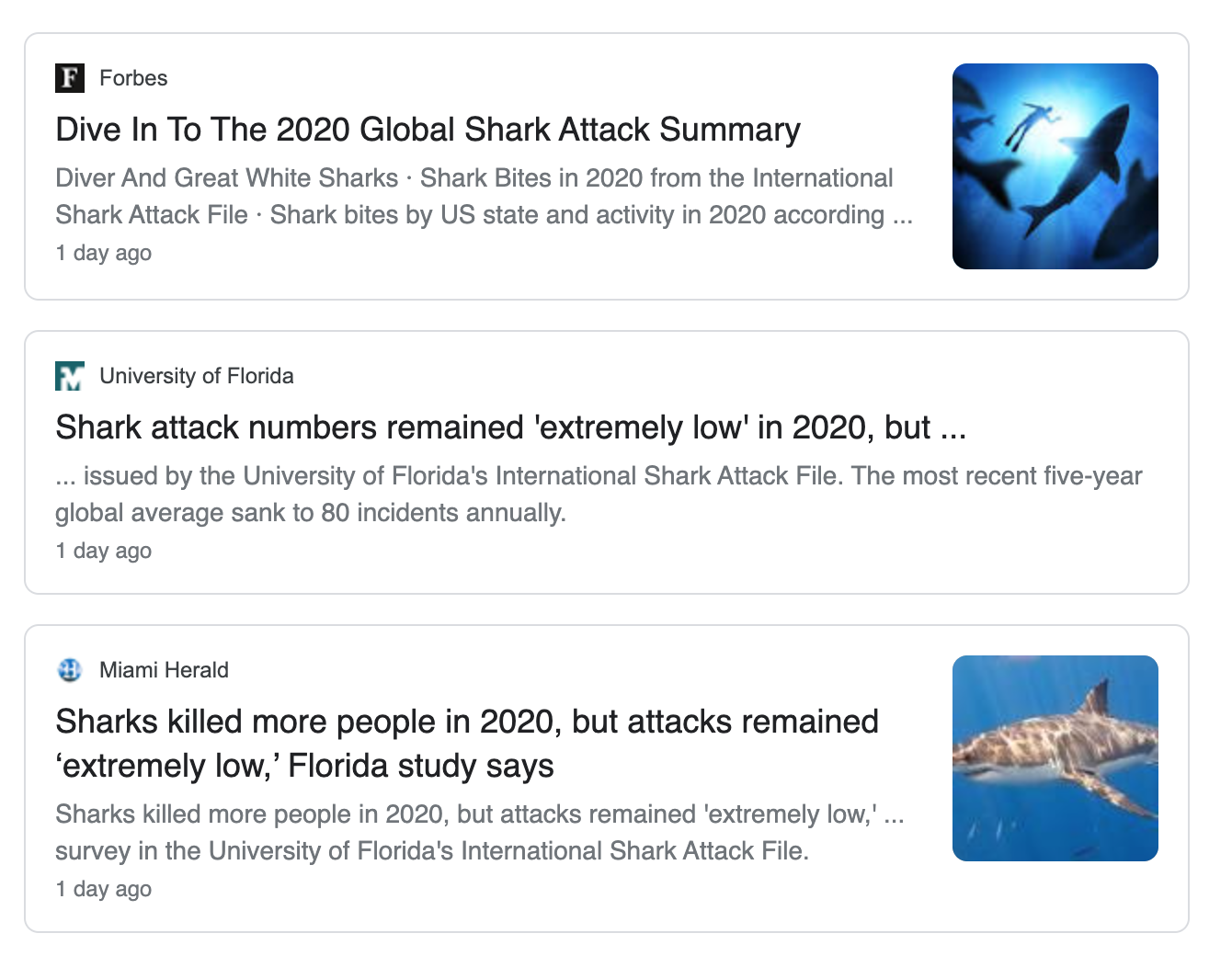Shark Attack File Results In The Media: Feeding Frenzy or Measured Response?
Shark Attack File survey results in the media: feeding frenzy or measured response?
The University of Florida’s International Shark Attack File 2020 survey results surfaced earlier this week, and wherever there are stories about attacks, you can guarantee that the media will be circling them like, well, um, sharks.
There was no talk of a cloud in the shape of a killer shark, although it was inevitable that coverage wasn't always going to air on the side of being subtle. So here's how some of the world's media interpreted the data.
The Express in the UK couldn't even get the headline correct, talking about the wrong year, 'Shark attacks: Fatal shark attacks reach seven year high for 2021', whilst like many - Newsweek took a more measured approach with "Shark Attack Deaths Surged in 2020, But the Number of Attacks Declined', acknowledging both the rise in deaths but the decrease in the number of actual attacks.
The Miami Herald kicked off their article with 'Shark attacks worldwide dropped to “extremely low” numbers in 2020 but fatal bites spiked to more than twice the recent five-year average in what researchers are calling an anomaly.'
That's a marked difference to Fox News, who went with the headline of '2020 deadliest year for shark attacks since 2013', leading with the news of 10 unprovoked deaths, a figure seeming even larger when they point out there had only been two the previous year.
It's no surprise that they've led with the sensational, and it's not until the fourth and fifth paragraph that we are informed 'unprovoked shark attack numbers are down, from the average of 80 to 57, and that shark bites in the US are also down on last year, falling to 33 from 41.'
Figures, regarding attacks and deaths were up in Australia, so it was no surprise when Australian based news.com.au featured the provocative headline 'Fatal shark attacks spike to 86-year high across Australia.'
That's quite a headline, it certainly stops anyone reading it in their tracks. The article leads on the increased numbers of deaths in Australia - especially stark as there were no fatalities in Australia last year, but there were six reported in 2020. In fact, the article points out that there hasn't been such a deadly year for attacks in this part of the world since 1934.
To be fair, the article does make it very clear that this spike doesn't mean it is something we should be panicked about. It says:
Academics described the spike as “dramatic” but said there’s no cause for alarm.
“We expect some year-to-year variability in bite numbers and fatalities. One year does not make a trend,” International Shark File researchers said.
Starting out with a more measured approach is Forbes, whose article 'Dive in to the 2020 global shark summary' led with Covid-19 helping drive a significant reduction in global shark attacks last year.
They said: 'With far fewer people traveling to sunny shores for beachside vacations in 2020, logic would have it that means fewer people spent as much time in the ocean, be it to swim, surf, snorkel or scuba dive. By the same logic, fewer people in the water should therefore equate to fewer encounters between humans and sharks over the course of the year.'
'Such logic has indeed been born out in this year’s International Shark Attack File’s (ISAF) worldwide report for 2020.'
There was no escaping the increase in deaths, they stated that the 13 deaths in 2020 meant that it was an 'unusually deadly year.'
Despite the increase in shark attack deaths, the article is also very clear to point out that put in perspective it is still sharks that lose out in the ocean when it is man vs shark. With an estimated 100 million shark deaths every year 'the imbalance in human and shark fatalities reveals who the true victims are.' It's a sobering thought.
What was genuinely refreshing though was that the article, written by Duncan Madden, was keen to point out how trends point to a decline in incidents and deaths, which ' are a reflection of advances in beach safety, medical treatment and public awareness.'
The hope then is that man and sharks can share the same waters, more safely than they ever have done before.
Words Dean Newman


